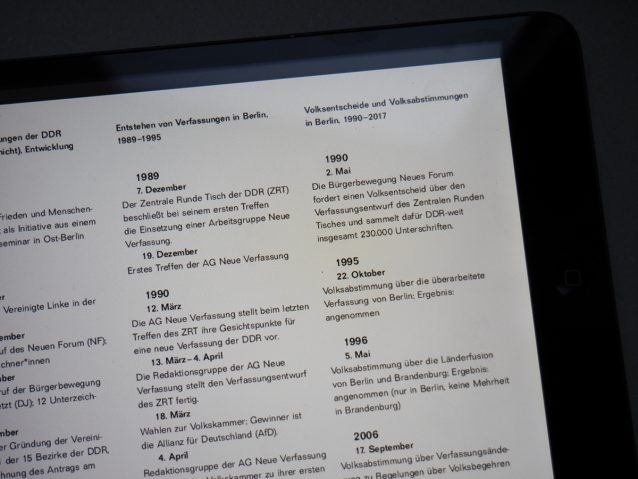Gemeingut Stadt
#4 / Nachdenken über städtisches Gemeinschaffen
3,99 €
„Gemeingüter sind weder etwas, das einfach da draußen existiert, noch sind sie etwas, das – objektiv gesehen – bestimmten Ressourcen oder Dingen innewohnt. Sie sind eine Beziehung zwischen Menschen und den von ihnen kollektiv als essentiell für ihre Existenz beschriebenen Bedingungen“, schreibt Stavros Stavrides, Architekt, Aktivist und Autor von Common Space: The City as Commons.
Stavrides versteht die Herstellung, Entwicklung und Pflege von Gemeingütern als eine soziale Praxis, die kapitalistische Werte und hierarchische Formen gesellschaftlicher Organisation radikal herausfordert. Auf diese Weise gestaltete städtische Räume unterscheiden sich von privatisierenden Einhegungen und von öffentlichem Raum, wie wir ihn kennen: gemeinsame Räume, die permanent einladend und im Entstehen begriffen sind, die nicht nur geteilt werden, sondern das Teilen selbst mitbestimmen.
In diesem von Mathias Heyden herausgegebenen Heft führt Stavrides in sein Nachdenken über das Gemeingut Stadt ein. Am Beispiel besetzter Plätze, selbstverwalteter Einrichtungen und autonomer Nachbarschaften in Griechenland und Lateinamerika veranschaulicht er seine Theorie eines städtischen Gemeinschaffens, das im Kontext der globalen Debatten und Kämpfe um soziale und ökonomische Gerechtigkeit einen möglichen Weg hin zu einer in der Tat emanzipierten Gesellschaft weist.
Produziert anlässlich des Projektes Ene Mene Muh und welche Stadt willst Du? Beiträge zum Berliner Wahlherbst 2016, neue Gesellschaft für bildende Kunst, Berlin, 2016/17, ngbk.de
Mathias Heyden
Mathias Heyden ist Tischler und Architekt sowie Mitbegründer des Berliner Wohn- und Kulturprojekts K 77, und agiert als Forscher und Vermittler, Aktivist und Publizist mit einem Fokus auf tatsächliche Teilhabe, ökonomische und ökologische Gerechtigkeit und Nachhaltigkeit im Planen und Bauen, Entwicklen und Betreiben von Raum.
Aus dementsprechenden Kollaborationen mit Architekt*innen und Künstler*innen gingen u. a. die Veranstaltungs-, Ausstellungs- und Publikationsprojekte Hier entsteht. Strategien partizipativer Architektur und räumlicher Aneignung (2003–2004), An Architektur 19 – 21: Community Design. Involvement and Architecture in the US since 1963 (2008–2010) und Where If Not Us? Participatory Design and Its Radical Approaches (2013–2015) hervor.
Neben regelmässig gegebenen Vorträgen, Workshops et cetera im In- und Ausland war er in den letzen 10 Jahren Lehrbeauftragter und wissenschaftlicher Mitarbeiter an der TU Berlin sowie Gastprofessor an der Akademie der Bildenden Künste in Nürnberg, und war jüngst Lehrender am California Institute of the Arts.
Stavros Stavrides
Dr. Stavros Stavrides, Architekt und Aktivist, ist Professor für architektonische Gestaltung und Theorie an der Schule für Architektur, Nationale Technische Universität Athen, Griechenland, wo er Graduierten-Kurse über Wohnraumgestaltung (inkl. Sozialwohnungswesen) und Postgraduierten-Kurse über die Bedeutung metropolitaner Erfahrung unterrichtet.
Parallel zu zahlreichen Texten über räumliche Theorie hat er die Bücher The Symbolic Relation to Space (1990), Advertising and the Meaning of Space (1996), The Texture of Things (mit E. Cotsou, 1996), From the City-Screen to the City-Stage (2002), Suspended Spaces of Alterity (2010), Towards the City of Thresholds (in Englisch 2010, in Spanisch und Türkisch 2016) and Common Space (2016) publiziert.
Seine aktuelle Forschung fokussiert auf Formen emanzipierender räumlicher Praktiken und Räumen des Gemeinschaffens.
Hg.: Mathias Heyden
Text: Stavros Stavrides, Mathias Heyden
Design: Ana Halina Ringleb, Simon Schindele
Design E-Book: EECLECTIC
Deutsch
64 Seiten (pdf), 16 Abbildungen
Mai 2018
ISBN 978-3-947295-04-3 epub (6 MB)
ISBN 978-3-947295-10-4 pdf (6 MB)
3,99 Euro
Als Buch erschienen bei: berlinerhefte.de
ISBN 978-3-946674-03-0
7,00 Euro
Das könnte dir auch gefallen …
-
Die Legende vom Sozialen Wohnungsbau
3,99 €#2 / Die Wohnungsfrage ist zurück im gesellschaftlichen Diskurs











